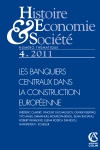Publication of Emmanuel Mourlon-Druol’s book: A Europe Made of Money
A Europe Made of Money is a new history of the making of the European Monetary System (EMS), based on extensive archive research. Emmanuel Mourlon-Druol highlights two long-term processes in the monetary and economic negotiations in the decade leading up to the founding of the EMS in 1979. The first is a transnational learning process involving… Continue reading




